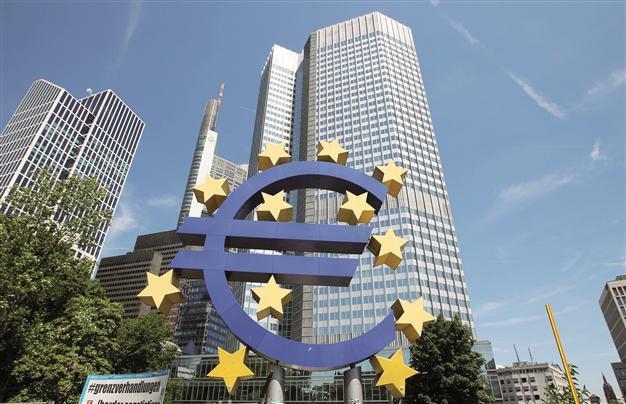ECB under pressure to stem strength of euro down
LONDON - The Associated Press

The European Central Bank has reduced its benchmark interest rate to a record low of 0.15 percent. It also set a negative rate for the deposits bank keep at the central bank in the hope that pushes them to lend more to businesses and households instead.
The European Central Bank (ECB) is coming under increasing pressure to do more to stem the strength of the euro currency, which is hurting exporters and keeping a lid on the region’s recovery from recession.ECB President Mario Draghi is likely to face questions on what can be done to reduce the value of the euro when he faces lawmakers at the European Parliament July 14.
At around $1.36, the euro has come down from its 2014 high of just below the $1.40 mark in May. Even so, the currency remains well above its historic average. That’s a problem for the region’s exporters as they try to drum up business in the growing global economy. Carmakers from Germany to Greek yoghurt makers find it more difficult to sell their wares when the euro is so strong.
With the economy barely growing and not creating many jobs, politicians are piling on the pressure on the central bank.
On July 10, French Economy Minister Arnaud Montebourg said the ECB should do more to weaken the euro to boost growth, which would help bring down the sky-high unemployment rate, particularly among the young. The ECB frowns upon such interventions by politicians as it does not want investors to doubt that it is able to set its policies independently of government pressure.
Quantitative easing may be used
If needed, the ECB could further loosen its monetary policy through interest rate cuts or launch a monetary stimulus similar to those undertaken by the U.S. Federal Reserve and the Bank of England.
Those programs involve injecting new money into the economy by buying large amounts of bonds and other financial assets.
Few economists think Draghi and the ECB want to go down that route, partly because of technical problems such as how to buy assets - and which ones - across a currency bloc comprising 18 countries.
However, Draghi has said such a program, called quantitative easing, or QE, is within the bank’s mandate and could be used if needed. And therein lie potential problems for Draghi and the ECB, according to Gary Jenkins, chief credit strategist at LNG Capital.
Having been told that QE is a possibility, Europe’s politicians may get increasingly exercised by the failure of the ECB to use such a program to help the economy, especially if growth remains anemic and inflation, at 0.5 percent, stays below the ECB’s target of just below 2 percent.
“Unless growth returns, I expect that European politicians will start to put him under more pressure to implement unconventional policy measures such as QE,” said Jenkins.
“These wolves will huff and puff until they blow the ECB’s defenses down.”
















